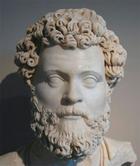
Dio Chrysostom, Dion of Prusa or Dion Cocceius (c. 40-c. 120) was an orator, writer, philosopher and Greek historian of the Roman Empire that flourished in the first century of its eighty Discursos.1 are conserved His name comes from Chrysostomos Greek, literally meaning 'golden mouth'. He was born in Prusa (now Bursa), in the Roman province of Bithynia (now part of northwestern Turkey). His date of birth is given between 40 and 45 d. C. cynical and became a Stoic, and is considered part of the seguda sophist school of Greek philosophers. Apparently he lived in Rome during the reign of Titus, for he wrote about a scandalous affair that the emperor had with the boxer Melancomas. He was critical of the emperor Domitian, who expelled him from Rome, Italy and Bithynia in 82 advising one of his relatives conspirators. During his exile apparently traveled extensively throughout the Empire, often dressed in rags and performing manual labor. After Domitian was assassinated in 96, is said to Dion spoke to a Roman camp mutinous troops and persuaded them to accept the will of the Roman people. Under the reign of the Emperor Nerva finished his exile and later adopted the surname Cocceius to honor their support for him, whose full name was Marcus Cocceius Nerva. After the death of a close friend of Nerva became emperor Trajan. In his later years Dion returned to Prusa, where he apparently had some status, as there are records of their participation in a lawsuit over urban renewal on the 111 is believed to have died some time after 112, possibly between 115 and 120.
His speeches cover a wide range of topics and speak written versions of his lectures. Some of these may have been prepared to represent Trajan on special occasions. Topics include the monarchy, lifestyle Diogenes of Sinope, vice and virtue, freedom, slavery, wealth, greed, war, hostility and peace, good governance and other moral issues. He also reasoned strongly against allowing prostitution.
He was a contemporary of Plutarch, Tacitus and Pliny the Younger. Although he did not write about Christians as such, his philosophy has been considered a moral parallel with that of Paul of Tarsus, and indicates that the early Christian Greeks resorted to cynical and stoic philosophies when developing their faith. Being a stoic, also advocated living according to nature and a simple life.




